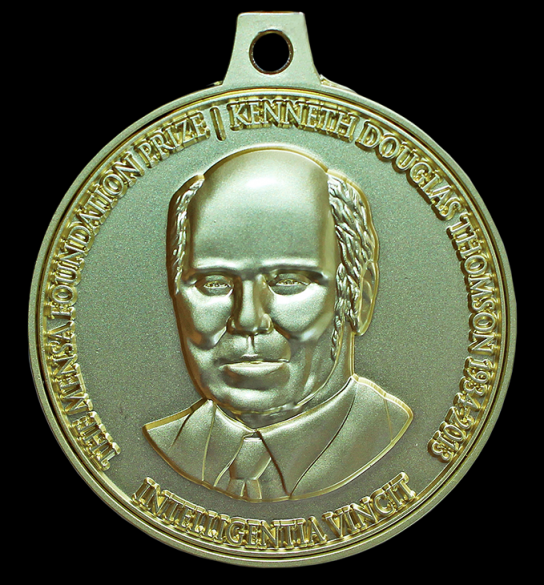Trending...
- Phinge CEO Ranked #1 Globally by Crunchbase for the Last Week, Will Be in Las Vegas Jan. 4-9, the Week of CES to Discuss Netverse & IPO Coming in 2026
- City of Chicago Shares Key Logistical, Safety Information for Upcoming New Year's Eve Celebration
- Milwaukee Job Corps Center Hosts Alumni Day, Calls Alumni to Action on Open Enrollment Campaign
Dr. R. Douglas Fields is a pioneer on nervous system development, plasticity, memory
HURST, Texas - illiNews -- R. Douglas Fields, Ph.D., a neuroscientist and author of numerous books and magazine articles about the brain, has been awarded the fourth Mensa Foundation Prize for his research in plasticity and active myelination in brains related to learning and intelligence.
The biennial Mensa Foundation Prize honors the best discoveries in intelligence and creativity and is endowed by the estate of Kenneth Douglas Thomson (1934-2013), a longtime Mensa member. The award, which includes a $10,000 award, will be presented at American Mensa's Annual Gathering, July 5-9, in Baltimore, and Dr. Fields will give a presentation on his work.
Dr. Fields' long-standing research interest is in how functional activity influences nervous system development and plasticity along with the cellular mechanisms of memory. He is recognized internationally for his research on glia, which are brain cells that communicate without electricity, and for his pioneering discoveries on a new cellular mechanism of learning involving glial cells that form myelin. Myelin is the electrical insulation on nerve fibers, which speeds transmission of neural impulses. Dr. Fields' research shows that the glial cells forming myelin can sense neural impulse activity and that they contribute to learning and memory by changing the speed of neural impulse transmission to optimize the synchrony of information arriving at relay points in neural networks.
More on illi News
"I am especially gratified by my research on how myelin contributes to learning," Dr. Fields said, "because it overturns long-standing dogma about myelin — that it is static electrical insulation — and because it is a complete departure from how neuroscientists have thought about the mechanisms of learning and memory being based only on modifying synapses."
The Mensa Foundation Prize Committee praised the impressive scientific detail of Dr. Fields' work and his creative point of view. "Each small component of the rather complex glial model is backed by numerous rigorous multidisciplinary experiments involving imaging, chemistry, actual measurement of nerve conduction speed, and correlated animal learning experiments," said Dr. Susan Stine, Mensa Foundation Prize Committee member. "I think the sheer body of work and the observations using multiple experimental designs is amazing."
Joining Dr. Stine on the Mensa Foundation Prize Committee are:
Dr. Fields is Chief of the Nervous System Development and Plasticity Section at the National Institutes of Health, an American Association for the Advancement of Science Fellow, and University of Maryland adjunct professor. He received advanced degrees at U.C. Berkeley, San Jose State University, and U.C. San Diego and was a postdoctoral fellow at Stanford and Yale universities and at the NIH prior to starting his own NIH lab in 1994.
More on illi News
Outside the lab, he writes about science for Scientific American, Quanta, Outside Magazine, Huffington Post, Undark Magazine, Psychology Today, and many others. His neuroscience research has been featured on national television, radio, NPR, the National Geographic, and other media, and he speaks about neuroscience for the general public on NPR, World Science Festival, TEDex, Google Talks, and others.
The first Mensa Foundation Prize was awarded in 2017 to Dr. David Silver, who led Google's efforts to develop the first computer program to defeat the world's best Go players. In 2019 neuroscientist Dr. Aron K. Barbey was recognized for significantly advancing the neuroscience of brain connectivity with his innovative research applying functional magnetic resonance imaging to the mapping of brain lesions and measuring their effects on raw intelligence. And in 2021, statistical geneticist Dr. Danielle Posthuma of the Netherlands was awarded the third Mensa Foundation Prize for her research directly identifying, for the first time, hundreds of human genes highly correlated to variations in intelligence.
"This award is such a great honor," Dr. Fields said, "because it comes from a group of people from all walks of life in an organization that values and supports science and creativity for the simple reason that human beings are deeply curious about the natural world and driven to explore and understand it."
The biennial Mensa Foundation Prize honors the best discoveries in intelligence and creativity and is endowed by the estate of Kenneth Douglas Thomson (1934-2013), a longtime Mensa member. The award, which includes a $10,000 award, will be presented at American Mensa's Annual Gathering, July 5-9, in Baltimore, and Dr. Fields will give a presentation on his work.
Dr. Fields' long-standing research interest is in how functional activity influences nervous system development and plasticity along with the cellular mechanisms of memory. He is recognized internationally for his research on glia, which are brain cells that communicate without electricity, and for his pioneering discoveries on a new cellular mechanism of learning involving glial cells that form myelin. Myelin is the electrical insulation on nerve fibers, which speeds transmission of neural impulses. Dr. Fields' research shows that the glial cells forming myelin can sense neural impulse activity and that they contribute to learning and memory by changing the speed of neural impulse transmission to optimize the synchrony of information arriving at relay points in neural networks.
More on illi News
- Genuine Hospitality, LLC Selected to Operate Hilton Garden Inn Birmingham SE / Liberty Park
- Documentary "Prescription for Violence: Psychiatry's Deadly Side Effects" Premieres, Exposes Link Between Psychiatric Drugs and Acts of Mass Violence
- Price Improvement on Luxurious Lāna'i Townhome with Stunning Ocean Views
- Nextvisit Co-Founder Ryan Yannelli Identifies Six Critical Factors for Behavioral Health Providers Evaluating AI Scribes in 2026
- Digi 995 Expands Its Puzzle Lineup With the Release of Digi 995: Word Maze on Mobile Platforms
"I am especially gratified by my research on how myelin contributes to learning," Dr. Fields said, "because it overturns long-standing dogma about myelin — that it is static electrical insulation — and because it is a complete departure from how neuroscientists have thought about the mechanisms of learning and memory being based only on modifying synapses."
The Mensa Foundation Prize Committee praised the impressive scientific detail of Dr. Fields' work and his creative point of view. "Each small component of the rather complex glial model is backed by numerous rigorous multidisciplinary experiments involving imaging, chemistry, actual measurement of nerve conduction speed, and correlated animal learning experiments," said Dr. Susan Stine, Mensa Foundation Prize Committee member. "I think the sheer body of work and the observations using multiple experimental designs is amazing."
Joining Dr. Stine on the Mensa Foundation Prize Committee are:
- Dr. Harry Ringermacher, Ph.D., physics, the committee chair and a Mensa member.
- Dr. Ivar Giaever, Ph.D., physics, microbiologist, and winner of the 1973 Nobel Prize in Physics.
- Dr. Steven Maranz, Ph.D., plant science, microbiologist, and a Mensa member.
- Judith A. Keating, CPA, TCE-IRS, and a Mensa member.
Dr. Fields is Chief of the Nervous System Development and Plasticity Section at the National Institutes of Health, an American Association for the Advancement of Science Fellow, and University of Maryland adjunct professor. He received advanced degrees at U.C. Berkeley, San Jose State University, and U.C. San Diego and was a postdoctoral fellow at Stanford and Yale universities and at the NIH prior to starting his own NIH lab in 1994.
More on illi News
- CredHub and Real Property Management Join Forces to Empower Franchise Owners with Rental Payment Credit Reporting Solutions
- Leimert Park Announces Weeklong Kwanzaa Festival & Kwanzaa Parade Celebrating Black History, Culture, and Community
- Renowned Alternative Medicine Specialist Dr. Sebi and His African Bio Mineral Balance Therapy Are the Focus of New Book
- Psychiatric Drug Damage Ignored for Decades; CCHR Demands Federal Action
- Phil Marley Releases Two Music Projects While Seeking Kidney Donor
Outside the lab, he writes about science for Scientific American, Quanta, Outside Magazine, Huffington Post, Undark Magazine, Psychology Today, and many others. His neuroscience research has been featured on national television, radio, NPR, the National Geographic, and other media, and he speaks about neuroscience for the general public on NPR, World Science Festival, TEDex, Google Talks, and others.
The first Mensa Foundation Prize was awarded in 2017 to Dr. David Silver, who led Google's efforts to develop the first computer program to defeat the world's best Go players. In 2019 neuroscientist Dr. Aron K. Barbey was recognized for significantly advancing the neuroscience of brain connectivity with his innovative research applying functional magnetic resonance imaging to the mapping of brain lesions and measuring their effects on raw intelligence. And in 2021, statistical geneticist Dr. Danielle Posthuma of the Netherlands was awarded the third Mensa Foundation Prize for her research directly identifying, for the first time, hundreds of human genes highly correlated to variations in intelligence.
"This award is such a great honor," Dr. Fields said, "because it comes from a group of people from all walks of life in an organization that values and supports science and creativity for the simple reason that human beings are deeply curious about the natural world and driven to explore and understand it."
Source: Mensa Foundation
Filed Under: Health
0 Comments
Latest on illi News
- Phinge CEO Ranked #1 Globally by Crunchbase for the Last Week, Will Be in Las Vegas Jan. 4-9, the Week of CES to Discuss Netverse & IPO Coming in 2026
- Women's Everyday Safety Is Changing - The Blue Luna Shows How
- Microgaming Unveils Red Papaya: A New Studio Delivering Cutting-Edge, Feature-Rich Slots
- 5-Star Duncan Injury Group Expands Personal Injury Representation to Arizona
- The City of Chicago Will Ring in the New Year with Fireworks on the Chicago River and at Navy Pier Wednesday, December 31
- City of Chicago Shares Key Logistical, Safety Information for Upcoming New Year's Eve Celebration
- The End of "Influencer" Gambling: Bonusetu Analyzes Finland's Strict New Casino Marketing Laws
- AI-Driven Cybersecurity Leader Gains Industry Recognition, Secures $6M Institutional Investment, Builds Momentum Toward $16M Annual Run-Rate Revenue
- TRIO Heating, Air & Plumbing Now Ranks #1 in San Jose
- Milwaukee Job Corps Center Hosts Alumni Day, Calls Alumni to Action on Open Enrollment Campaign
- Kanoa Debuts Gluten-Free Filled Cereals, Delivering Bold Flavor & Better Nutrition for Anytime Snac
- Golden Paper Identifies Global Growth in Packaging Papers and Upgrades Its High-End Production Capacity
- Champagne, Caviar Bumps & Pole Performances — Welcome the New Year Early with HandPicked Social Club
- A New Soul Album: Heart Of Kwanzaa, 7-Day Celebration
- Allegiant Management Group Named 2025 Market Leader in Orlando by PropertyManagement.com
- National Van Lines Delivers Holiday Cheer with Aspire Partnership
- NAFMNP Awarded USDA Cooperative Agreement to Continue MarketLink Program Under FFAB
- Costa Oil - 10 Minute Oil Change Surpasses 70 Locations with Construction of San Antonio, TX Stores — Eyes Growth Via Acquisition or Being Acquired
- LaTerra and Respark Under Contract with AIMCO to Acquire a $455M, 7-Property Chicago Multifamily Portfolio
- Record Revenue, Tax Tailwinds, and AI-Driven Scale: Why Off The Hook YS Inc. Is Emerging as a Standout in the $57 Billion U.S. Marine Market


